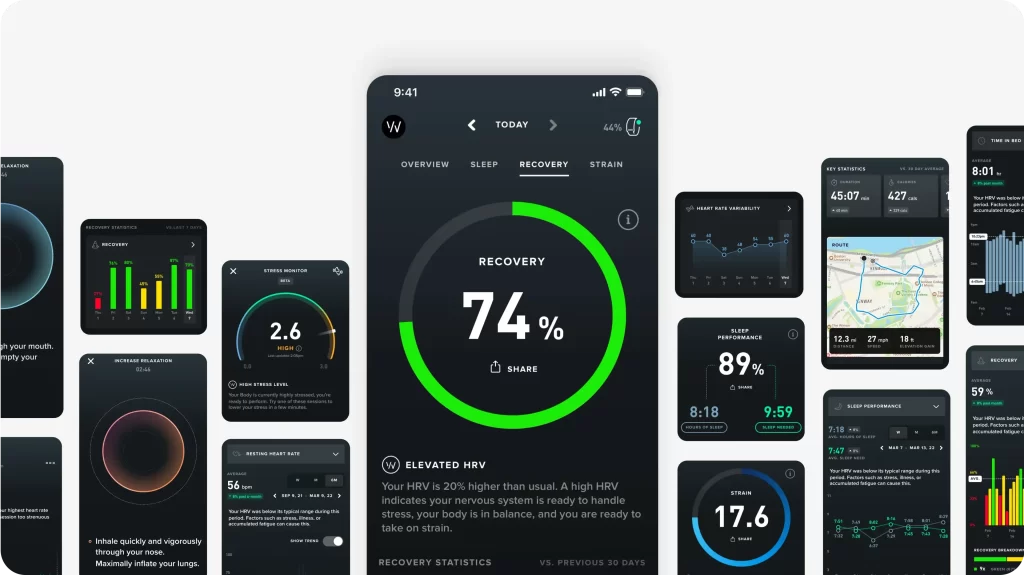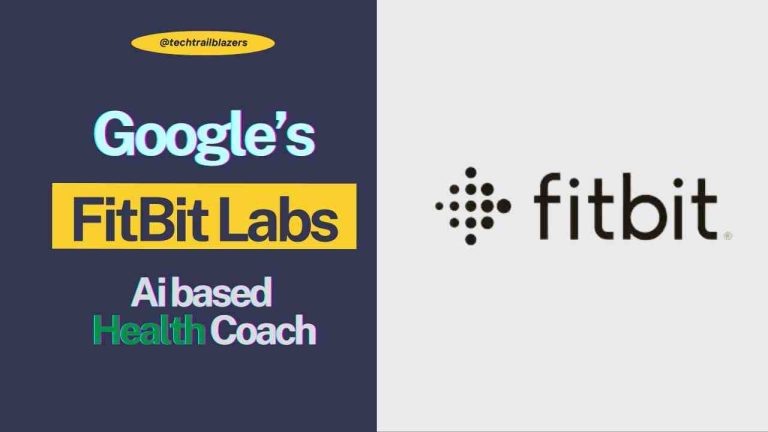Get Fitter, Get Smarter: Exploring Google’s AI-powered Fitbit Labs
Calling all health enthusiasts! Google is on the verge of launching a revolutionary tool designed to transform your fitness journey – Fitbit Labs. This innovative feature, powered by cutting-edge Artificial Intelligence (AI), promises to be more than just a data tracker; it aspires to be your personalized health coach, right on your wrist.
Unveiling the Power of AI in Fitness
Fitbit Labs leverages Google’s expertise in AI to unlock deeper insights from your Fitbit data. Imagine a virtual coach that analyzes your sleep patterns, activity levels, and other health metrics. Based on this analysis, Fitbit Labs can answer your questions in a natural, conversational way and even generate personalized recommendations.
For example, if you inquire about a recent dip in your sleep quality, the AI coach might analyze your activity data and suggest adjusting your workout intensity for better sleep. This interactive approach empowers you to understand your health data and make informed decisions towards your fitness goals.
Future Fitness: A Glimpse into Exciting Possibilities with AI-powered Fitbit Labs
Fitbit Labs, Google’s upcoming AI-powered health coaching tool built within Fitbit, promises to be a game-changer for health-conscious app subscribers. Here’s a deeper dive into some of the exciting possibilities this technology holds for the future:
1. Proactive Health Management:
- Move beyond reactive fitness tracking. Imagine your AI coach analyzing your data and identifying potential health risks before they become major issues.
- For example, the AI might detect slight heart rate variations during sleep that could indicate early signs of sleep apnea. It could then recommend consulting a doctor for further evaluation.
- This proactive approach allows you to address potential health concerns early on, leading to better overall well-being.
2. Personalized Nutrition Coaching:
- Forget generic diet plans. With Fitbit Labs, your AI coach can create a personalized nutrition plan tailored specifically to you.
- It could analyze your activity data and calorie burn, combined with your weight goals and preferences, to recommend suitable food options.
- Imagine receiving suggestions for high-protein meals after strength training sessions or reminders to increase hydration based on your workout intensity. This personalized approach to nutrition can significantly improve your fitness results.
3. AI-powered Mental Wellness Support:
- Fitness isn’t just about physical health. Fitbit Labs can analyze your sleep patterns, activity levels, and heart rate variability to identify potential stress factors.
- Based on this data, the AI coach could recommend stress management techniques such as meditation, yoga, or breathing exercises.
- It could even suggest adjustments to your sleep schedule or activity routine, known to impact stress levels. This integrated approach to well-being acknowledges the mind-body connection for a holistic fitness experience.
4. Gamification and Motivation:
- AI can be a powerful tool for motivation. Fitbit Labs could introduce gamified elements into your workout routine.
- Imagine the AI coach setting personalized daily or weekly challenges based on your progress and fitness goals. Earning virtual badges or rewards for achieving targets could make maintaining a fitness routine more engaging and fun.
5. Integration with Other Health Apps:
- With your consent, Fitbit Labs could potentially integrate with other health applications you use.
- This could allow for a more comprehensive picture of your health. For example, the AI could analyze your blood sugar data (if using a connected glucometer) and suggest dietary adjustments based on your activity and glucose levels.
The Future of Fitness is Personalized:
Fitbit Labs represents a significant shift from generic fitness trackers to personalized health coaching. This technology has the potential to:
- Empower individuals to take control of their health by providing deeper insights into their bodies.
- Simplify complex health information through AI-powered analysis and recommendations.
- Make fitness more engaging and sustainable through personalized guidance and gamification.
- Promote a holistic approach to well-being that addresses both physical and mental health.
As AI technology continues to evolve, the possibilities for future fitness are truly limitless. Fitbit Labs is just the beginning of a journey towards a smarter, more personalized approach to achieving your health and wellness goals.
While Fitbit Labs is a unique concept with its focus on AI-powered coaching within a fitness tracker, there are existing apps that offer similar functionalities. Here are two strong competitors for Fitbit Labs, each with its own strengths:
1. Nike Run Club Coach (NRC Coach):

- Strength: Personalized Training Plans – NRC Coach excels in creating personalized training plans based on your fitness level, goals (e.g., speed, distance), and available time. It offers guided audio runs with adaptive coaching that adjusts the workout intensity based on your performance.
- Potential Shortcomings: Limited data integration – NRC Coach primarily focuses on running data and might not integrate as seamlessly with other health metrics tracked by Fitbit (like sleep or heart rate). It might also be less suitable for users interested in activities beyond running.
2. WHOOP (To be launched soon in India):

- Strength: Advanced Recovery Tracking – WHOOP goes beyond basic activity tracking and delves deep into recovery metrics like heart rate variability and sleep analysis. It provides personalized insights into how your body is recovering and suggests recovery strategies like sleep optimization or lighter workouts.
- Potential Shortcomings: Subscription Cost – Unlike Fitbit Labs (potentially included with Fitbit Premium), WHOOP requires a monthly subscription fee which might be a deterrent for some users. Additionally, the interface might be less user-friendly compared to Fitbit Labs’ potential conversational approach.
The Best Choice Depends on Your Needs:
Ultimately, the best app for you depends on your specific needs and preferences. Here’s a quick breakdown:
- Choose NRC Coach if: You’re a runner looking for a personalized training plan with adaptive coaching.
- Choose WHOOP if: You prioritize advanced recovery insights and are willing to pay a subscription fee.
- Wait for Fitbit Labs if: You’re a Fitbit user interested in a holistic AI-powered coaching experience integrated within your existing fitness tracker (availability and features are yet to be confirmed).
Fitness Tech: A Goldmine for Startups and Developers

The fitness tech industry is booming, fueled by a growing emphasis on health and wellness. This presents a plethora of opportunities for startups and developers to innovate and disrupt the market. Here’s a glimpse into the exciting scope:
1. Niche Fitness Apps:
There’s room beyond generic fitness trackers. Develop apps catering to specific needs like yoga, meditation, prenatal fitness, or chronic disease management.
2. Wearable Tech Integration:
Focus on creating seamless integration between fitness trackers, smartwatches, and health apps. This can allow for a more comprehensive user experience.
3. AI-powered Coaching:
Similar to Fitbit Labs, explore AI’s potential to personalize workout plans, nutrition advice, and recovery recommendations.
4. Gamification and Motivation:
Develop engaging features like challenges, rewards, and social elements to make fitness fun and keep users motivated.
5. Virtual Reality (VR) Fitness:
VR offers immersive workout experiences. Design VR fitness programs or games that make exercise interactive and enjoyable.
VisionPro Platform: A Specific Focus
For developers building on the VisionPro platform, consider these aspects:
- Develop vision-based exercise tracking: Leverage computer vision to track exercise form and provide real-time feedback for injury prevention and improved technique.
- AR Fitness Overlays: Design Augmented Reality (AR) overlays that project workout instructions or motivational visuals directly onto the user’s environment.
- Vision-based health assessments: Explore using computer vision to analyze posture, gait, or balance for potential health insights.
By focusing on these areas, startups and developers can create innovative fitness solutions that cater to the evolving needs of health-conscious individuals. The future of fitness tech is personalized, engaging, and data-driven, and there’s immense potential for those who dare to innovate.
Tech Trailblazers
Read more: Google’s Circle to Search Gets a Superpower | Apple Vision Pro: A Gateway to a Spatial Revolution | Stepping into Infinity: Disney’s HoloTile Redefines Virtual Movement

